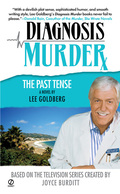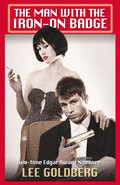My friend Warren Murphy, co-creator of THE DESTROYER books, has found a unique way of dealing with fanfic based on his work… he’s just edited & published a book of "Remo Williams" stories written by fans.
Lee Goldberg
Anne McCaffrey on Fanfic
Someone sent me a link to a very interesting segment of the NPR program STUDIO 360 about author Anne McCaffrey’s battles with fanficcers. It’s worth a listen.
Tod on Rains on Rainbow Party
My brother Tod reviews the controversial book RAINBOW PARTY in this month’s issue of Las Vegas City Life.
The problem, however, is that Rainbow Party isn’t actually scandalous or graphic…In another time, Rainbow Party might have been a "very special" episode of "The Facts Of Life," replete with a nice moralizing sermon by Mrs. Garrett. It’s harmless in a disappointing way — there’s no sense of the very real pressures young people face regarding sexuality — but it is the controversy generated by the parents that is truly troubling, especially when one considers the ultimate message of the book: Practice abstinence. Of course, those cloistered and closed-minded enough to demand the book be banned have already spoken to this.
Breaking Rocks
When writing is going well, the words spill out of me faster than I can type. I feel like I am in a losing race to keep up with the scenes playing out in my head.
When writing is going badly, as it has been the last couple of days, I feel like I am trying to chisel granite.
I have an outline, so it’s not like I don’t know where I’m going… I just don’t know how to get there. Every word, every sentence is a struggle, and even when I get them down on paper, it hardly seems worth it, since every single word sucks. The writing is flat, the dialogue rings false, and the humor is non-existent. But I keep pounding away, waiting for that moment when I will write the line that sings, that unlocks everything, and then suddenly I will be on a roll again. Writing will be easy, the characters alive, and the world they live in filled with color and details. Not only will I go back and fix all the crap I wrote before, but I will steamroll ahead without a moment’s doubt or uncertainty…
Until I hit that granite again.
That New Book Smell
 My ten author copies of DIAGNOSIS MURDER: THE PAST TENSE arrived today (coincidentally, my brother Tod got his author copies of SIMPLIFY today, too). This is my fifth book in the DM series, and maybe the 20th book I’ve written, but the thrill of opening that box of author copies hasn’t worn off. I still get excited holding the book for the first time, flipping through the pages, picking out paragraphs at random to read. I even like the smell. It’s like I need to confirm to myself that it’s real…because I’m still insecure enough to be surprised that I’m getting published at all.
My ten author copies of DIAGNOSIS MURDER: THE PAST TENSE arrived today (coincidentally, my brother Tod got his author copies of SIMPLIFY today, too). This is my fifth book in the DM series, and maybe the 20th book I’ve written, but the thrill of opening that box of author copies hasn’t worn off. I still get excited holding the book for the first time, flipping through the pages, picking out paragraphs at random to read. I even like the smell. It’s like I need to confirm to myself that it’s real…because I’m still insecure enough to be surprised that I’m getting published at all.
On the other hand, I don’t get a charge out of seeing my name on screen any more. It took me four of five episodes before I noticed my "Creative Consultant" credit was missing from MISSING (it had been dropped due to Canadian content requirements). The studio pulled it and didn’t tell us. They assumed we wouldn’t notice. Shockingly, they were right. I wish that wasn’t true…I miss the thrill I used to get from seeing my screen credit.
I also got my cover for THE MAN WITH THE IRON-ON BADGE over the holiday weekend. Seeing a bookcover for the first time is almost as exciting for me as getting that box of books, but in an entirely different way. Here’s why: by the time the books come, I’ve already seen the cover and the typeset manuscript, but not all of it together as a genuine book. I know what’s going to be in the box when I open it. But when the bookcover arrives, it’s a complete unknown… I have no idea what it will look like (or if I will hate it). I usually can’t wait to get my hands on the book-jacket and that hasn’t changed, even with the DM books (which look more-or-less the same every time but change elements within the established template).
I’m glad the thrill hasn’t waned for me yet…and I hope it never does.
(Click on the pictures for larger images. Thanks to Keith Snyder for transfering the PDF for me!)
UPDATE (7-8-05): Author Alison Kent discovered that sometimes there’s a darkside to getting your authors copies…
You know, I love author copies. It is so much fun to actually get your hands on a book in print. And then you turn it over. And you read the back cover copy. And they mention your heroine Erin Thatcher by calling her ERIN FLETCHER!!! What the heck are these people smoking???
The General Picked Me!
I got this email today:
Hello Friend,
I am General Oliver Okwara (retired). I Live in Victoria Islands, Nigeria, Africa Continent.
After a careful study of your economy, I have chosen to make substantial investments for my children in your country, if you are willing to guide or represent my interest in your country. I look forward to communicate further with you.Thank you
I’m flattered that after all that careful study the General picked me, a lowly tv writer and novelist, out of everybody else in America to advise him on his investments. This is obviously a very intelligent man. I’ve emailed him back asking him what I can do to help and if he has any TV series ideas I can pitch for him.
Still Having Tech Problems
You haven’t heard from me because I’m having lots of problems with Typepad, the service I use for this blog. This is the first time I’ve been able to access my blog and post a message since Friday. I hope things return to normal on Monday.
Tech problems have prevented me from blogging and life has prevented me from doing much work on my second MONK book this weekend. Yesterday was my daughter’s 10th birthday and we had a family birthday party/barbecue with my Mom, my sisters, my brothers-in-law and my niece and nephew. And today, I’m off to the beach with the same merry bunch.
Happy Fourth of July to you and your family!
You Don’t Know Jack
Cynthia Potts discovered Jack:
Jack is a magazine by fanfic writers, designed to showcase homoerotic fiction.
And even they don’t want any fanfiction! But the kicker: To submit, you have to
have been a fanfic writer at some point.Translation: We only want lazy
thieves to contribute to our magazine. People who don’t see a problem with
stealing other writer’s work and perverting the intent of the story. It helps if
they’re so clueless that they don’t know the stealing is wrong, but are actually
proud of the theft.
This seemed just too bizarre to be true. But it’s for real.
Welcome to JACK, an ezine of original homoerotic fiction written by Fanfiction
Writers. The staff of JACK firmly believes in the artistic validity of textual
erotica. Our goal is to create a zine that reflects our enthusiasm and love for
homoerotic (both male/male and female/female) literature while also showcasing a
wide range of talented authors……The only requirement for our authors (beyond writing good fiction and being of
legal age) is that you must have written fanfiction at some time. Links would be
appreciated. Submit all stories in plain text format in the body of an email to:
keystrokepress@gmail.com with
JACK Submission in the subject header. Because of virus concerns, all
attached files will be deleted unread.
So fanfiction really is practice for writing…if you want to write for an online magazine featuring homoerotic stories.
Chelsea Quinn Yarbro says NO to fanfic
Holly Lisle is hardly alone. Celebrated author Chelsea Quinn Yarbro is no fan of fanfic, either. From her "official" Yahoo discussion group:
Please note:
CHELSEA QUINN YARBRO does NOT ENDORSE FAN FICTIONAny attempt to violate her copyright will result in criminal prosecution by her legal services.
Since becoming the official Chelsea Quinn Yarbro Group we will no longer be able to post personal poetry or other works by members anywhere within the group pages or posts. This is due to recent developments that aren’t with this group, but for other legal reasons.
In Globe and Mail article, Yarbro describes some of her run-ins with fanficcers.
"I have absolutely no sense of humour
about copyright infringement," she writes. Yarbro has dealt with four
instances of infringement during her career, including one where a fan
story was printed in a magazine against her express wishes and the writer
even mentioned as much in an introduction. Although Yarbro has managed
to settle these issues out of court, she points out that in the U.S.,
"willful infringement, meaning you know the writer has said no and
you do it anyway, carries with it a maximum federal fine of $250,000 and
a maximum of five years in a federal penitentiary."When asked whether non-profit on-line fan fiction constitutes
at least a grey area, she responds: "I think it is nonsense — and
that is a mild word for the one I would prefer to use — and that fans
who do it show a profound disrespect for the writer and the work they
misappropriate in such cases. If fans want to write, they should make
up their own stories with their own characters. That’s what fiction is
all about."
Megan Lindholm says NO to Fanfic
Fantasy author Megan Lindholm/Robin Hobb comes out strongly against fanfic on her site. She tackles all the usual "pro-fanfic" arguments one by one and in great detail. Among her comments:
“I should be flattered that readers like my stories enough to want to
continue them.”
That’s not flattering. That’s insulting. Every
fan fiction I’ve read to date, based on my world or any other writer’s world,
had focused on changing the writer’s careful work to suit the foible of the fan
writer. Romances are invented, gender identities changed, fetishes indulged and
endings are altered. It’s not flattery. To me, it is the fan fiction writer
saying, “Look, the original author really screwed up the story, so I’m going to
fix it. Here is how it should have gone.” At the extreme low end of the
spectrum, fan fiction becomes personal masturbation fantasy in which the fan
reader is interacting with the writer’s character. That isn’t healthy for
anyone.
On the notion that fanfiction is good "practice" for becoming a writer, she says, in part:
No. It isn’t. If this is true, then karaoke is the path to become a singer,
coloring books produce great artists, and all great chefs have a shelf of cake
mixes. Fan fiction is a good way to avoid learning how to be a writer.
Fan fiction allows the writer to pretend to be creating a story, while using
someone else’s world, characters, and plot. Coloring Barbie’s hair green in a
coloring book is not a great act of creativity. Neither is putting lipstick on
Ken. Fan fiction does exactly those kinds of things.
Her long, self-described "rant" is worth a look.
